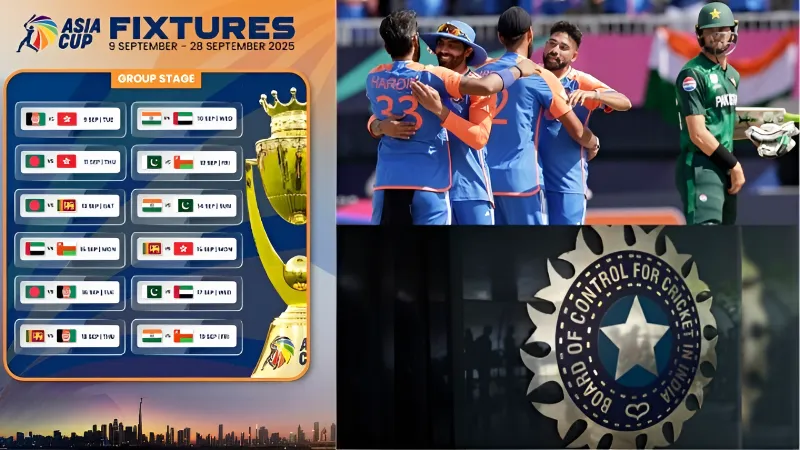Ah, the never-ending drama of one of the biggest rivalries in cricket, India vs Pakistan, it’s like a blockbuster movie that we can never stop talking about! But this time, it’s former India captain Mohammad Azharuddin who took a swipe at the BCCI for what he referred to as double standards. The cricket board is preparing to “play” Pakistan in the Asia Cup, but will not schedule any bilateral series. Confusing right? Let’s break it down!
The BCCI’s Tug-of-War: Playing Pakistan but Avoiding Bilateral Series
Things are about to get fun. BCCI, despite enduring political tensions, has agreed to play alongside Pakistan in the Asia Cup. Starting September 9 in the UAE, the Asia Cup features India and Pakistan competing in the same group stage. So, the two rivals will play at least once, and possibly three times if they both advance. It has the potential to be a fun tournament…BUT, the BCCI is committed to playing only in tournaments and lags in bilateral matches, for so-called geopolitical reasons.
Azharuddin declares this hypocrisy. If you are not willing to interact with Pakistan under bilateral circumstances – circumstances that require more planning and cooperation – why be willing to do it at international tournaments? It’s like saying I won’t meet my friend for coffee, but I will crash their parties. Azharuddin believes that either both forms of cricketing interaction are okay, or both forms are not okay.
What’s Behind the BCCI’s Stand? Politics, Power, and Public Sentiment
In all honesty, cricket between India and Pakistan is not just a sport; it is inextricably tied to politics and people’s emotions. The BCCI’s unwillingness to play bilateral series is under pressure from diplomatic issues and sentimentality on both sides. The act of playing or supporting cricket by hosting Pakistan on Indian soil, or sending an Indian team to Pakistan, is an endorsement of either government, and neither is in the mood for that.
International tournaments, such as the Asia Cup, are organized by the Asian Cricket Council (ACC) as multi-national events and not bilateral events. Thus, the BCCI is using the backdoor avenue to participation without us acknowledging bilateral relations. Furthermore, as the Asia Cup is played in the UAE, the BCCI does not have to deal with the uncomfortable situation of hosting Pakistan at home.
The Fans Caught in the Crossfire: Who Wins and Who Loses?
As the boards and governments engage in this chess match, the real casualties are the fans. India-Pakistan games are events, not games; events that halt entire nations, with drama, passion, and memories that last a lifetime. While the Asia Cup matches will surely provide excitement, fans will miss the bilateral series over time that have provided more opportunities to develop vivid cricket narratives and rivalries.
Azharuddin’s point resonates here – inconsistency undermines the essence of the game. If we are indeed trying to cultivate healthy competition and sportspersonship, then either take the whole package or reconsider this hybrid strategy of piecemeal action. Until that happens, fans will remain keen and mildly frustrated, anxiously waiting for the next India-Pakistan match – if it’s anything more than just a unique episode.
The controversy stirred by Azharuddin’s critique of the BCCI reveals a complicated blend of sport and politics. Although we cannot ignore geopolitics, is it fair for cricket lovers to be taken hostage by these decisions? Should cricket try to get above politics, or is the sport doomed to be in the cauldron of tension between nations?
To catch up on the most current news on all of your favorite thrilling cricket updates, visit Six6slive to access our comprehensive Latest News, insightful analysis, and updates. Connect with the action now to make sure you never miss out!
